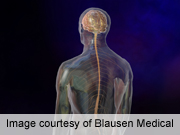
WEDNESDAY, Sept. 19 (HealthDay News) — A new pill can help prevent relapse in some people with multiple sclerosis (MS), new research indicates.
In two studies, the annualized relapse rate was cut nearly in half with twice-daily use of the new drug currently known as BG-12. One study also found that BG-12 could reduce the progression of disability, while the other study found no statistically significant difference between the drug and placebo for rates of disability.
“We found a robust reduction in the annualized relapse rate of 44 percent in the twice-daily group and 51 percent in the thrice-daily group,” said Dr. Robert Fox, lead author of one of the studies and medical director at the Mellen Center for MS at the Cleveland Clinic, in Ohio.
Fox added that the drug was well tolerated in the clinical trial, and appears to be quite safe. “It’s a pill they take twice a day at home, and there was no increased risk of opportunistic infections or cancer,” he noted.
Results of the studies are published in the Sept. 20 issue of the New England Journal of Medicine. Both were funded by the drug’s manufacturer, Biogen Idec.
Multiple sclerosis is an autoimmune disease that damages the outside of nerve fibers in the central nervous system, which includes the brain, spine and optic nerves, according to the National Multiple Sclerosis Society (NMSS). Symptoms can include fatigue, numbness in the limbs, balance and coordination problems, bladder or bowel dysfunction, vision problems, pain and even paralysis.
Most people — about 85 percent — have a form of MS that’s called relapsing-remitting, according to the NMSS. That means that people have periods where the disease is very active. At other times, the disease remits. During these periods of remission, there may be complete or partial recovery of function, and the disease doesn’t progress during remission.
Both of the current studies focused on people with the relapsing-remitting form of MS.
Fox’s study included 359 patients taking 240 milligrams (mg) of BG-12 twice a day, 345 taking 240 mg three times a day, 350 taking glatiramer acetate (an injectable MS drug) and 363 taking a placebo. BG-12 was originally developed as a drug to treat the autoimmune skin condition psoriasis.
The annual relapse rate was 0.22 for people taking BG-12 twice a day and 0.20 for those taking it three times a day. The annual relapse rate was 0.29 for glatiramer acetate and 0.40 for those on placebo. There were no statistically significant differences in the rate of disability progression among the groups, according to the study.
The second study included 410 people taking BG-12 twice a day, 416 people taking the drug three times a day and 408 people on placebo.
The annual relapse rate was 0.17 for the twice-daily group, 0.19 in the thrice-daily group and 0.36 in the placebo group. Rates of disability progression were 16 percent in the twice-daily group, 18 percent in the thrice-daily group and 27 percent in the placebo group, according to the study.
“These studies show the potential for another oral treatment for relapsing-remitting MS. They illustrate that trying new strategies and tackling new parts of the immune system can be effective,” explained Timothy Coetzee, chief research officer at the National Multiple Sclerosis Society.
“Having a treatment that targets different pathways in the immune system is important. This is an advance in the treatment of MS in my view,” Coetzee said.
Fox said that BG-12 appears to modify the immune system response without suppressing the immune system, a common problem with some other medications available for MS. Fox said that the new drug also appears to protect nervous system cells from damage, though how that occurs isn’t yet clear.
The U.S. Food and Drug Administration is expected to make a decision on whether or not to approve BG-12 by the end of the year, according to Fox. No information on what the cost of BG-12 will be is currently available.
More information
Learn more about available treatments from the National Multiple Sclerosis Society.

